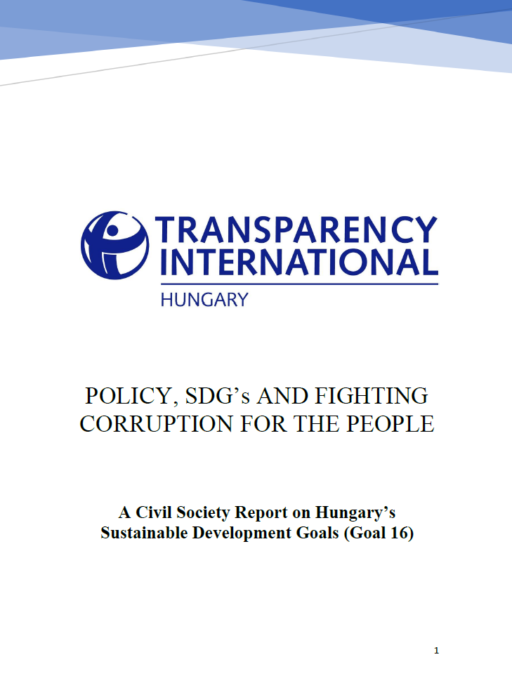Hungary: Progress Towards Sustainable Development Goal 16
Description
The United Nation’s Sustainable Development Goals (SDGs) set out an ambitious global development agenda until the year 2030. They consist of 17 goals, and the goal 16 specifically targets measures for transparency and accountability, and the fight against corruption. These goals intend to significantly reduce illicit financial and arms flows, strengthen the recovery and return of stolen assets and combat all forms of organized crime; substantially reduce corruption and bribery in all their forms; develop effective, accountable and transparent institutions at all levels and ensure public access to information and protect fundamental freedoms, in accordance with national legislation and international agreements.
Transparency International Hungary Foundation made an in-depth assessment of the aforementioned goals, and revealed serious deficiencies and challenges. The main reason is why some of the development goals are not or not sufficiently met in Hungary has been the fact that corruption has become institutionalized and systemic in the country.
A peculiarity of the Hungarian situation is that a strong tension between regulation and practice has developed since the incumbent government captured the state in a steady process after 2010. On one hand, a large number of regulations contain anticorruption provisions in compliance with European Union standards. This is the case, for instance in certain regulatory aspects of public procurement, whistleblower protection, access to information, political finance and mandatory disclosure. On the other hand, enforcement and practice is particularistic and biased favouring loyalists and cronies.
Recommendations
- As the main corruption risk is the capture of state institutions by government interests, we urge the government to re-establish the democratic checks and balances and the professional autonomy of state institutions, and enhance their capacity to effectively and efficiently carry out their mandate.
- Concerning public procurements – as the main vehicle for funnelling public money to political actors – an effective and independent controlling mechanism should be established. And an adequate legal remedy system would be of utmost importance in order to enforce the present legal framework.
- The government ought to strengthen the legal framework that governs the accessibility of public interest information by, inter alia, 1) revising legal provisions that enable secrecy; 2) promoting proactive disclosure practices; and 3) expecting corporations to reveal information concerning their beneficial owners.
- The government ought to introduce more stringent legal provisions to enhance transparency and accountability of political finance, and ought to set higher standards of the implementation of such provisions in order to incentivise an intransigent enforcement of the legal norms concerned.
- The government should reinstate and reaffirm public trust in the political elite also by reforming the current system of interest, income and asset disclosures by expecting a higher level of transparency and by exercising more rigorous control.
- The government ought to publicly acknowledge the significance of whistleblowing by not just condoning these people who expose wrongdoing and thereby take a risk, but also by introducing a system to offer them reliable protection and sufficient financial support. In addition, the government should also adopt necessary regulations to guarantee that reports made by whistleblowers are thoroughly examined.
- We urge the government to incentivize companies that participate in public procurement to adopt integrity measures. Companies should introduce coherent rules and systems in order to extensively tackle corruption risks and maintain regulatory compliance. Companies should make their operation and organizational structure available to public, thus become accountable to stakeholders.
- The government should create a new, comprehensive legislative framework on transparent lobbying through a legitimate and inclusive process that meets the long-term support of all stakeholders concerned. We encourage market players and their respective professional organisations to apply lobbying self-regulation tools and promote responsible lobbying practices in general.
- The independence of the media authority has to be re-established in order to foster a wider supply of outlets and broadcasters and to halt the tendency of the distortion of the media market towards government players. The regulation should promote free competition in the media sector, e.g. facilitating that the state advertisements should not be directed exclusively to the pro-government outlets.
Authors
Dr. Miklos Ligeti, legal director, TI HungaryDr. Jozsef Peter Martin, executive director, TI Hungary
Dr. Gabriella Nagy, head of public finance programs, TI Hungary
Krisztina Papp, COO, TI Hungary
Project manager
Dániel Szabó, TI Hungary
Date
04/09/2018
Tags
 Download PDF
Download PDF
